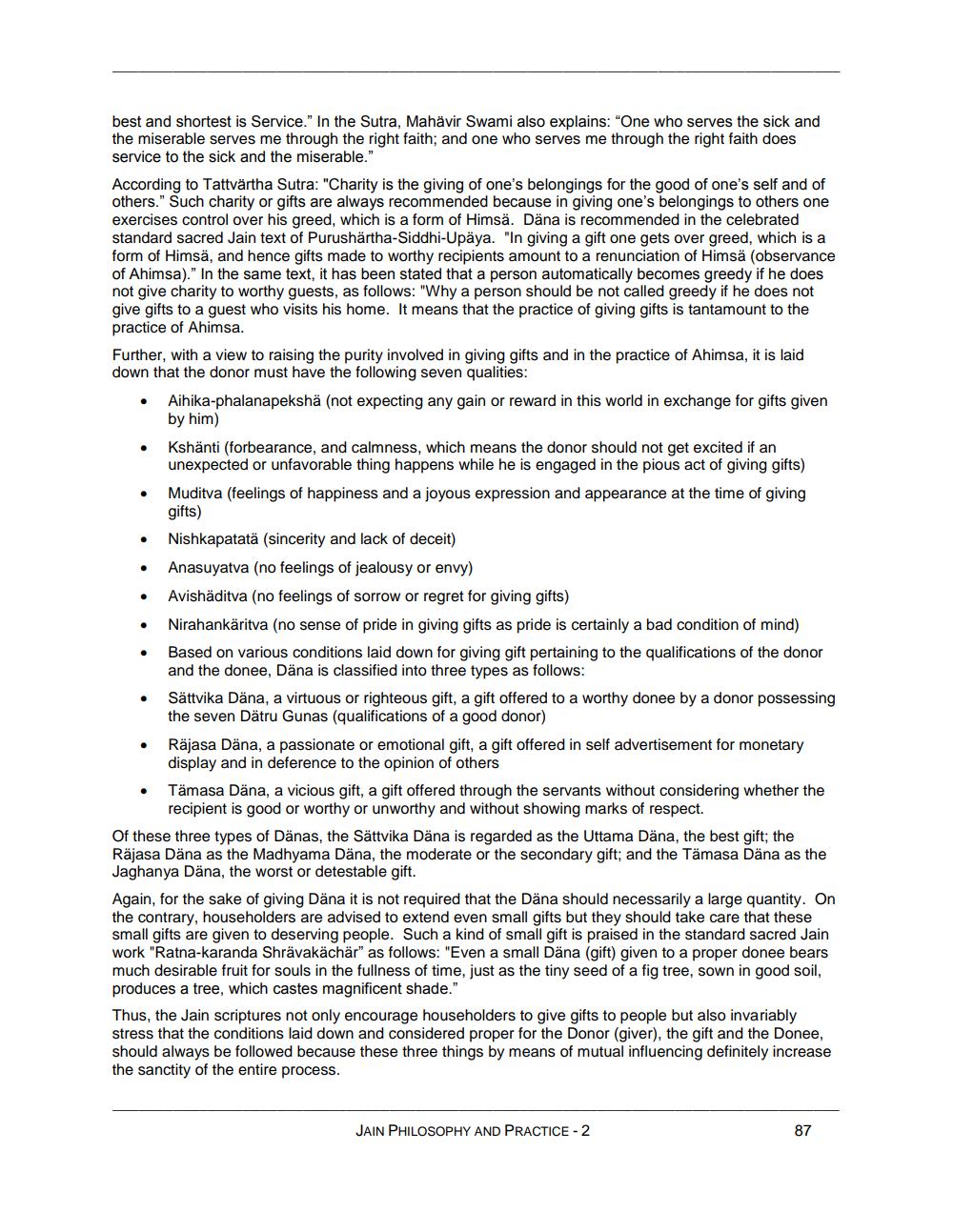________________
best and shortest is Service." In the Sutra, Mahävir Swami also explains: "One who serves the sick and the miserable serves me through the right faith; and one who serves me through the right faith does service to the sick and the miserable."
According to Tattvärtha Sutra: "Charity is the giving of one's belongings for the good of one's self and of others." Such charity or gifts are always recommended because in giving one's belongings to others one exercises control over his greed, which is a form of Himsä. Däna is recommended in the celebrated standard sacred Jain text of Purushärtha-Siddhi-Upäya. "In giving a gift one gets over greed, which is a form of Himsä, and hence gifts made to worthy recipients amount to a renunciation of Himsä (observance of Ahimsa)." In the same text, it has been stated that a person automatically becomes greedy if he does not give charity to worthy guests, as follows: "Why a person should be not called greedy if he does not give gifts to a guest who visits his home. It means that the practice of giving gifts is tantamount to the practice of Ahimsa.
Further, with a view to raising the purity involved in giving gifts and in the practice of Ahimsa, it is laid down that the donor must have the following seven qualities:
• Aihika-phalanapekshä (not expecting any gain or reward in this world in exchange for gifts given by him)
Kshänti (forbearance, and calmness, which means the donor should not get excited if an unexpected or unfavorable thing happens while he is engaged in the pious act of giving gifts) Muditva (feelings of happiness and a joyous expression and appearance at the time of giving gifts)
Nishkapatatä (sincerity and lack of deceit)
• Anasuyatva (no feelings of jealousy or envy)
•
· Avishäditva (no feelings of sorrow or regret for giving gifts)
Nirahankäritva (no sense of pride in giving gifts as pride is certainly a bad condition of mind)
Based on various conditions laid down for giving gift pertaining to the qualifications of the donor and the donee, Däna is classified into three types as follows:
•
•
Sättvika Däna, a virtuous or righteous gift, a gift offered to a worthy donee by a donor possessing the seven Dätru Gunas (qualifications of a good donor)
Räjasa Däna, a passionate or emotional gift, a gift offered in self advertisement for monetary display and in deference to the opinion of others
Tämasa Däna, a vicious gift, a gift offered through the servants without considering whether the recipient is good or worthy or unworthy and without showing marks of respect.
Of these three types of Dänas, the Sättvika Däna is regarded as the Uttama Däna, the best gift; the Räjasa Däna as the Madhyama Däna, the moderate or the secondary gift; and the Tämasa Däna as the Jaghanya Däna, the worst or detestable gift.
Again, for the sake of giving Däna it is not required that the Däna should necessarily a large quantity. On the contrary, householders are advised to extend even small gifts but they should take care that these small gifts are given to deserving people. Such a kind of small gift is praised in the standard sacred Jain work "Ratna-karanda Shrävakächär" as follows: "Even a small Däna (gift) given to a proper donee bears much desirable fruit for souls in the fullness of time, just as the tiny seed of a fig tree, sown in good soil, produces a tree, which castes magnificent shade."
Thus, the Jain scriptures not only encourage householders to give gifts to people but also invariably stress that the conditions laid down and considered proper for the Donor (giver), the gift and the Donee, should always be followed because these three things by means of mutual influencing definitely increase the sanctity of the entire process.
JAIN PHILOSOPHY AND PRACTICE - 2
87




